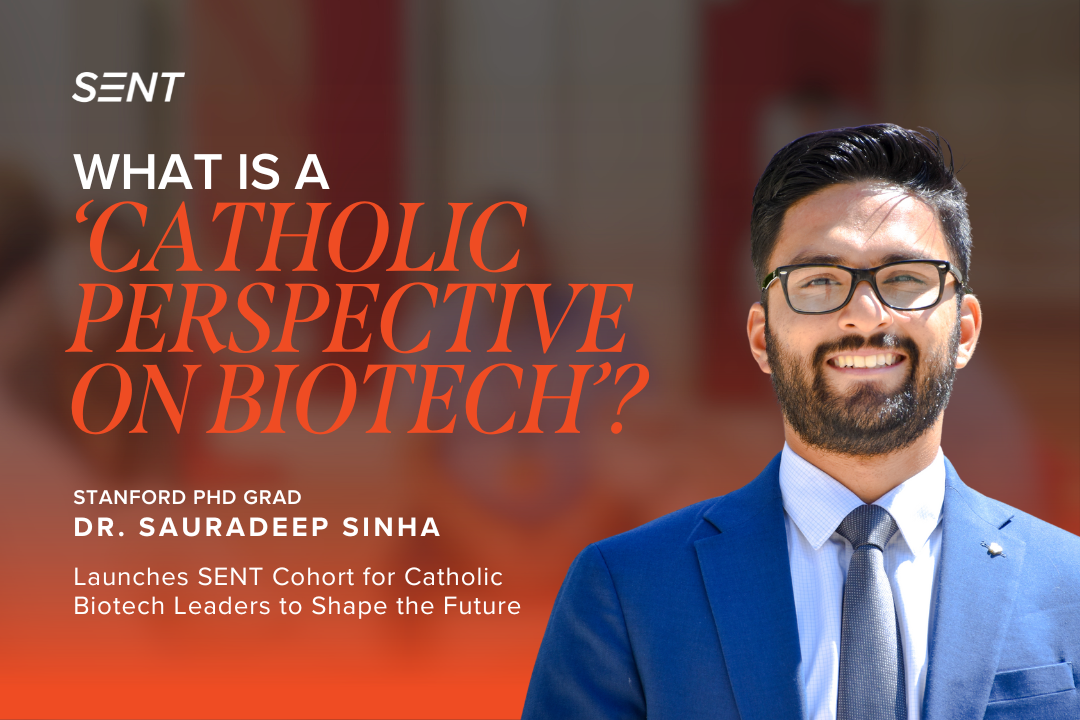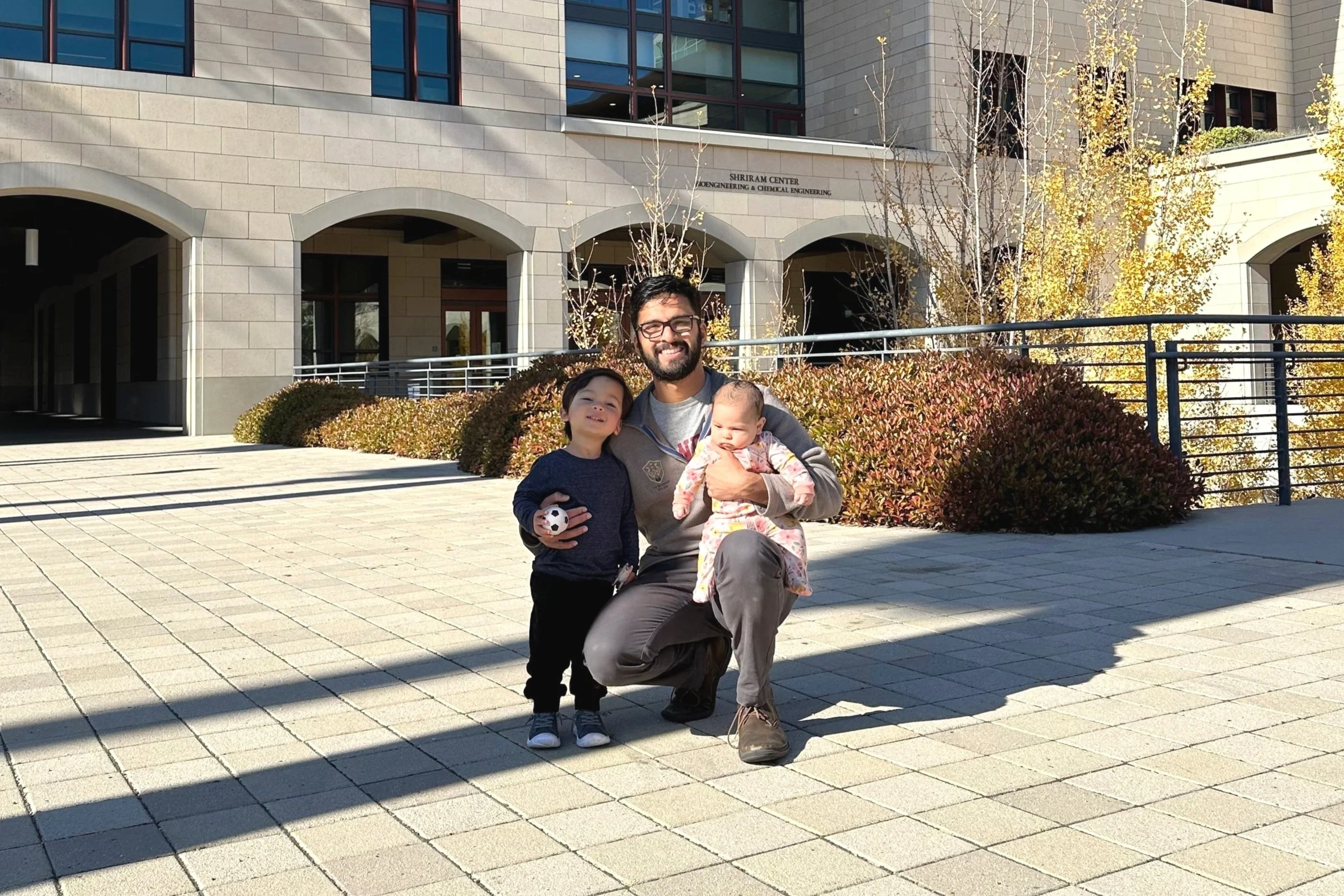What is a Catholic perspective on biotech? Stanford PhD Grad Launches SENT Cohort for Catholic Biotech Leaders to Shape the Future
SENT’s Biotech Cohort for Catholic Entrepreneurs
Recent Stanford bioengineering PhD graduate, Dr. Sauradeep Sinha, has joined forces with SENT to launch a biotechnology-specific Fellowship cohort.
As a rapidly evolving field, the biotech space presents difficult challenges. Thanks to experience and knowledge, Sauradeep offers unique insight into this industry.
Read on to understand how Sauradeep hopes to unite Catholic biotech leaders for greater impact.
The Foundations
As an undergraduate student, Sauradeep studied chemical engineering, intending to go to medical school. However, after meeting his future wife, Kaitlin, and deciding to get married, Sauradeep’s desire to devote more time to family life and fatherhood steered him away from medical school and towards a bioengineering PhD.
Simultaneously, Sauradeep felt himself drawn to the Catholic Church. Discovering the Church’s beautiful teachings on chastity, encountering Jesus in the Eucharist, and volunteering with the Missionaries of Charity were especially transformative in his conversion. After his first year in grad school at Stanford, Sauradeep entered the Church on St. Jude’s feast day. He now specializes in pediatric brain cancers and CAR T-Cell therapy at, providentially, St. Jude Children’s Research Hospital.
Dr. Sauradeep Sinha with his two children
To Build Up God’s Kingdom
“Throughout grad school, I was always looking for ways to use my training and my academic education for building up God’s kingdom,” Sauradeep recalls. The disjunction between faith and work was something he felt acutely. Immersed in research, training, and studies, Sauradeep also felt the isolation of navigating bioethical questions. While his work in biotech focused on the health and well-being of the human person, he often encountered perspectives that lacked the correct moral foundations.
Biotech innovations push the boundaries of what can be done to help the human person. As biotechnology progresses, Catholics face ethical quandaries, especially as our innovations can have a profound impact on inherent human dignity. A biotech entrepreneur who has created a useful tool may receive funding from a high-profile investor who wants to use that technology to ultimately violate the dignity of the human person. Likewise, a particular innovation may have unethical consequences on matters related to the beginning or end of life. With the rising prevalence of AI, new challenges arising about how patient data is used must be carefully evaluated.
In the secular field of biotech, Catholics stand apart. Every biotech innovation has a significant potential to do good but may also possess destructive potential if abused. Because Catholicism is built on the foundation of God’s moral law, by necessity, it must approach biotech from a distinctive perspective.
What does a Catholic biotech perspective look like?
While the Church seeks to recognize the successes of scientific discoveries, she must do so with scrutiny. Each new scientific breakthrough must be examined through a faith-informed, moral lens. “The Church is beautifully humble in the sense that it recognizes that she cannot explain everything as we continuously make new discoveries,” Sauradeep acknowledges. The wisdom of the Church provides clear guidance for how to respond to scientific innovations in a manner that will honor God, uphold the human person, and steward creation.
Biotech entrepreneurs are uniquely equipped to follow the rich tradition of the Catholic faith through the innovations they create. As Sauradeep emphasizes, “It is up to us as Catholics to properly direct the use of these technologies to glorify God and sanctify the world.” Now more than ever, Catholic biotech entrepreneurs must be rigorously trained in bioethics and openly discuss how Catholic thought interplays with their innovations. Well-versed Catholic biotech innovators bring important moral perspective into this ever-developing tech space.
Why Biotech Leaders Need Community
We all need community. But “Catholic biotech entrepreneurs, especially early-stage founders, are on islands,” Sauradeep observes. They need to be connected to the like-minded peers who exist in their field but are difficult to find. The Catholic biotech entrepreneur needs peer support that extends beyond the workplace and into faith and family life.
It was these considerations that drew Sauradeep to the SENT Fellowship and prompted him to create this community: a biotech-specific cohort that equips Catholic biotech entrepreneurs with a community centered around Christ, enabling them to navigate the secular biotech space. Sauradeep is eager to use his training to connect these leaders and build a refreshing, fortifying community.
What can a potential biotech fellow gain by joining the biotech cohort?
Community with like-minded, Christ-focused biotech entrepreneurs to navigate industry-specific concerns and challenges
Formation and discussions on bioethical considerations led by Catholic bioethicists
Guidance in fundraising and networking with Catholic investors looking to fund good Catholics
Access to a rich Catholic community to help identify executive teams, form advising boards, get mentorship, and source funds
The Vision of SENT’s Biotech Fellowship
The mustard seed speck can grow into a huge tree if it is planted in good soil. Small and hidden initiatives, if centered on Christ, can have infinite impact. The vision of SENT’s new biotech Fellowship cohort is to begin with a small group of 7-10 members that can grow slowly over time. “These 7-10 members,” Sauradeep explains, “will be equipped and formed to radically confront the secular biotech landscape and make decisions for their innovations that can sanctify their marketplaces, employees, and the world.”
Want to Apply or Learn More?
To apply for the biotech Fellowship cohort, please click here.
For any other questions related to the biotech Fellowship, please contact anthony@sentventures.com and deep@sentventures.com !


